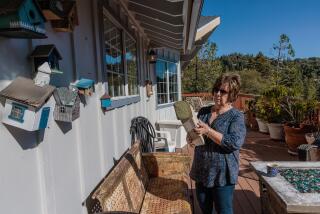A Rocky Mountain Low in Aspen
- Share via
Things are tough all over.
I would have thought that we would find Aspen (Colo.), a tiny ski resort in the Rocky Mountains, blissfully free of the evils that overcrowding and technology have visited on most of our other population centers, large and small.
Though its central mall tends toward the overly quaint, Aspen is a very pretty and amiable little town. The air is pure, the sun brilliant. It is thronged by summer visitors, but they are for the most part pleasant and polite. There is no buffoonery, even among the teen-agers, who appear to be in the majority. Cars invariably give way to pedestrians. The standard garb, even at dinner, is shorts and T-shirts.
But under that placid facade Aspen boils with fear and anger. Just from reading the local Aspen Times, which does not shy away from reporting the town’s faults and problems, I found that many of the permanent residents resent outsiders; they feel threatened and stressed. They are alarmed about a number of hideous developments.
Following are just a few of the situations that have embroiled the town in strife and controversy.
Parking places are so scarce around the mall that the city is building a parking structure. However, ground water pouring into the excavation threatens to undermine a nearby rugby field and even to sink a popular restaurant and mod clothing store, Boogie’s, at the edge of the mall. (Boogie’s is thought to stand over an old water-filled mining hole.)
The housing shortage is acute. Aspen is a museum piece of handsome Victorian houses, many of them beautifully restored with modern touches; but the rising population has driven prices out of reach: A page of real-estate ads in the Times shows houses for sale at prices from $415,000 to $8 million, with most in the millions.
A Times columnist contemplates the question “Who sold Aspen?” in reference to the flood of outsiders buying Aspen property. He answers: “Us. We’ve done it to ourselves; as Pogo once said, ‘We have met the enemy and he is us.’ ”
As a result of the housing crunch, the Times reported, 500 Aspen workers are homeless. They have been forced “to camp, live in their cars, or sleep on friends’ couches.” Politicians speaking at a rally in Paepcke Park were heckled by signs reading “We need support for affordable housing now.”
The Environmental Protection Agency, a very busy agency in Aspen, has agreed to dig up and remove one foot of ground from a 110-acre housing site because of the dangerous level of lead in the soil.
Environmentalists are fighting the Aspen Skiing Co.’s proposed expansion of the Burnt Mountain ski area because of its threat to wildlife.
Animal rights advocates are pressuring the city to ban fur sales. (Aspen shops are full of luxuriant furs.) In a letter to the editor, a woman who signed herself “a stressed-out full-time permanent resident,” wrote, “So those who want to buy furs in Aspen might go someplace else? We should be so lucky! What a marvelous way to reduce the stressful crowding!”
The state plans to widen congested Colorado 82, which transects the town and moves 25,000 cars a day, but it will take years; anticipating resistance, the Highway Department has prepared an environmental impact study “the size of two Aspen telephone books.”
Environmentalists are up in arms over the U.S. Forest Service’s plan to cut down 3,000 acres of aspen trees in a scenic pass. “It’s got masses of aspen trees,” said one opponent, “and that’s what they want--masses of aspen trees.”
Writing in the paper’s opinion section, Susy Ellison, a naturalist, recalled how in the 1880s the miners “invaded” the valley, driving out the Indians and turning the river orange and fishless with the effluent from their mines.
She conceded that technology could accommodate continued growth for humans, but she warned: “While it may take years to exceed the carrying capacity for humans, we should add a new parameter to our measurements--quality. Our lives and needs are intertwined with those of wildlife. We can grow indefinitely in Pitkin County, but we must think of the cost.”
I was glad to get back to Los Angeles, where our only problems are overcrowding, traffic congestion, gang killings, smog, trash, inadequate housing, racism, sexism, earthquakes and the inevitable water shortage.
More to Read
Sign up for The Wild
We’ll help you find the best places to hike, bike and run, as well as the perfect silent spots for meditation and yoga.
You may occasionally receive promotional content from the Los Angeles Times.






